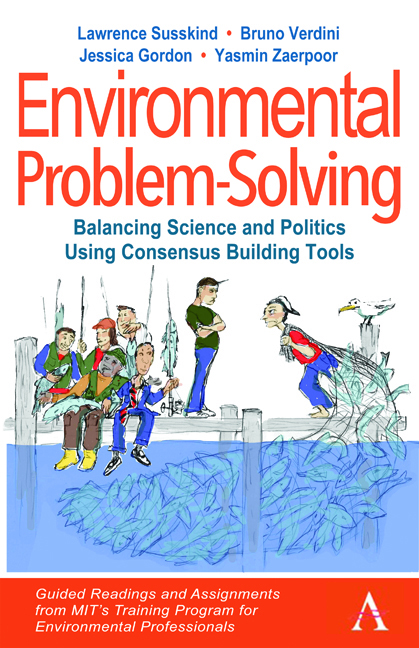 Environmental Problem-Solving: Balancing Science and Politics Using Consensus Building Tools
Environmental Problem-Solving: Balancing Science and Politics Using Consensus Building Tools Book contents
- Frontmatter
- Contents
- Acknowledgments
- Credits and Permissions
- Introduction
- Unit I: Influencing The Environmental Policy-Making Process
- Unit II: Ethical Dilemmas In Environmental Problem-Solving
- Unit III: Developments In Policy And Project Analysis
- Unit IV: Collective Action To Solve Environmental Problems
- Final Exam
- Conclusions
- Biographies
- References
- Index
Final Exam
Published online by Cambridge University Press: 15 December 2020
- Frontmatter
- Contents
- Acknowledgments
- Credits and Permissions
- Introduction
- Unit I: Influencing The Environmental Policy-Making Process
- Unit II: Ethical Dilemmas In Environmental Problem-Solving
- Unit III: Developments In Policy And Project Analysis
- Unit IV: Collective Action To Solve Environmental Problems
- Final Exam
- Conclusions
- Biographies
- References
- Index
Summary
Questions
1. The city has made a commitment to incorporate potential climate risks into its review of all proposed projects in the areas of the city prone to flooding. Along these lines, it has received a grant of $250,000 from a local foundation to underwrite the work of a “blue ribbon” science advisory committee to advise the city over the next 12 months on how to ensure that climate risks are managed appropriately in low-lying areas. A number of activist groups in the city are not included on the blue ribbon committee, even though they have been working for several years to promote more ambitious climate adaptation policies. They feel they should be given a leadership role in formulating the city's Flood Risk Management and Climate Adaptation Plan. In response, the mayor has announced that he will hold four “town hall meetings”—one every two months—in different locations to ensure that all groups have a chance to present their ideas on “flood risk management.” He has also promised to hire a professional polling firm to undertake a scientific poll of public opinion on flood risk and climate adaptation. He will use the results of the poll and the town hall meetings to inform the work of his science advisory committee. Drawing upon what we have covered in this book, write a 250–to–500-word editorial or op-ed that will be published in the local newspaper either supporting or challenging the city's public engagement strategy on this issue.
2. Habitat conservation is important, especially in ecologically significant areas. Five years ago, the state government initiated a river restoration strategy and allocated substantial funding and professional staff to support its work. The focus of this initiative has been almost entirely on the larger rivers that run through the state and support all kinds of ecological, commercial and residential activities in the surrounding watershed. Your environmental management firm has been asked by the state legislature to organize an assessment of the river restoration program. Even before you collect any scientific evidence, you need to think about the structure of your evaluation. What kinds of things should you be trying to measure? Why? What approaches to data gathering and analysis will you use? What problems or difficulties do you anticipate? How will you try to handle them?
- Type
- Chapter
- Information
- Environmental Problem-Solving: Balancing Science and Politics Using Consensus Building ToolsGuided Readings and Assignments from MIT's Training Program for Environmental Professionals, pp. 471 - 480Publisher: Anthem PressPrint publication year: 2020


